Young thief and his mother
A young man had been caught in a daring act of theft and had been condemned to be executed for it.
He expressed his desire to see his mother, and to speak with her before he was led to execution. And, of course, this was granted.
When his mother came to him, he said: “I want to whisper to you.”
And when she brought her ear near him, he nearly bit it off. All the bystanders were horrified, and asked him what he could mean by such brutal and inhuman conduct.
“It is to punish her,” he said. “When I was young I began with stealing little things, and brought them home to mother. Instead of rebuking and punishing me, she laughed and said: ‘It will not be noticed.’ It is because of her that I am here today.”
“He is right, woman,” said the priest; “the Lord hath said: “Train up a child in the way he should go; and when he is old, he will not depart therefrom.”
The point of many observers should be quite clear by now, namely that the quality of Malawian leaders who have monopolised the show in the democratic dispensation leaves a lot to be desired.
Many stakeholders are far from being impressed with the disposition of these self-acclaimed born-again politicians who graduated from the post-independence school of ‘theftocracy’.
What changes in Malawian political play is simply the script, but the writers, directors and actors in every new political play are the same old faces which used to act in the previous regimes.
Thus, Malawi has failed to make much headway on the road to purposeful political and economical development because the country’s political leaders have not employed its resources for that end, but have been used for the greater development of themselves and few cronies: thieves and opportunists.
Without encyclopaedic knowledge, one recognises this has been a continuing custom that has gained tremendous momentum in the multiparty era.
The failure by the country’s political systems is being manifested in such acts as thieving without shame in an attempt to survive economically, hitchhiking from one party to another, forming reactive political parties out of frustration, monopolising and abusing public resources and reluctance to retire from active politics.
In fact, that First Deputy Speaker Esther Mcheka-Chilenje and Second Deputy Speaker Clement Chiwaya — people entrusted to inspire and bring integrity to the public – have allegedly been drawing millions of kwacha in rental allowances which are way above their entitlement may well be more akin to reflex action than calculated malice.
Without denying the fact that Mcheka-Chilenje’s and Chiwaya’s alleged acts spring from the immorality within the two legislators, one could still say the country’s encounter with ancestor of kleptocracy, Bakili Muluzi’s United Democratic Front, has made it suffer many terrible and lasting misfortunes.
The encounter warped the mental attitudes of once diligent and hard-working Malawians, and the country has never recovered from the malaise up to date.
Which is why Mcheka-Chilenje and Chiwaya are examples of people who could defy Winston Churchill’s logic that those “who fail to learn from history are doomed to repeat it”, and, amid Cahsgate trials, engage in shameful theft of meagre public resources.
Churchill’s telling warning is obviously lost on Malawi’s political mandarins.
But this scenario should provoke thinking among Malawians that indubitably the country needs some serious ‘transformative or restorative rebirth’ in how it perceives ‘elective office’, ‘public service’ and the ‘public good’.
The country also needs some ‘creative destruction’ and removal, through permissible and better ways possible, of mediocre and heartless politicians for it to make any headway with any development agenda it aspires to.




